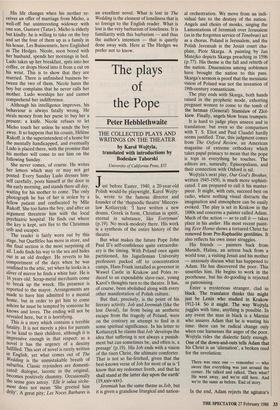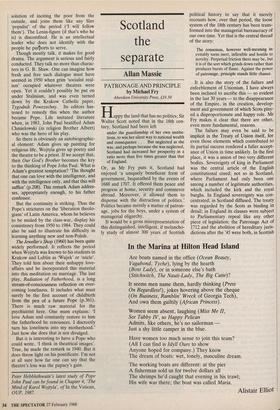The plays of the Pope
Peter Hebblethwaite
THE COLLECTED PLAYS AND WRITINGS ON THE THEATER by Karol Wojtyla, translated with introductions by Bodeslaw Taborski University of California Press, $35 Just before Easter, 1940, a 20-year-old Polish would-be playwright, Karol Wojty- la, wrote to the famous director and founder of the 'rhapsodic theatre' Mieczys- law Kotlarcyzk: 'I have written a new drama, Greek in form, Christian in spirit, eternal in substance, like Everyman' (p.19). No mock-modesty there. His work is a synthesis of the entire history of the theatre.
But what makes the future Pope John Paul II's self-confidence quite extraordin- ary is the timing. With Poland once again partitioned, his Jagiellonian University professors packed off to concentration camps, Hans Frank installed as governor in Wawel Castle in Krakow and Poles re- duced to an expendable slave-race, young Karol's thoughts turn to the theatre. It has, of course, been abolished along with every other manifestation of Polish culture.
But that, precisely, is the point of his literary activity. Job and Jeremiah (like the lost David), far from being an aesthetic escape from the tragedy of Poland, were on the contrary an attempt to find in it some spiritual significance. In his letter to Kotlarczyk he claims that Job 'develops the idea that suffering is not always a punish- ment but can sometimes be, and often is, a presage' (p.19). His Job ends with a vision of the risen Christ, the ultimate comforter. That is not so far-fetched, given that the best-known verse of Job for most of us is 'I know that my redeemer liveth, and that he shall stand at the latter day upon the earth' (19,xxiv-xxv). Jeremiah has the same theme as Job, but it is given a grandiose liturgical and nation- al orchestration. We move from an indi- vidual fate to the destiny of the nation. Angels and choirs of monks, singing the Lamentations of Jeremiah over Jerusalem (as in the forgotten service of Tenebrae) act as a chorus. Poland is Jerusalem, and the Polish Jeremiah is the Jesuit court cha- plain, Piotr Skarga. A painting by Jan Matejko depicts Skarga preaching in 1596 (p.77). His theme is the fall and rebirth of the nation. Dissensions among noblemen have brought the nation to this pass. Skarga's sermon is proof that the messianic vision of Poland was not the invention of 19th-century romanticism.
The play ends with Skarga, both hands raised in the prophetic mode, exhorting pregnant women to come to the tomb of the hetman (General) Stanislaw of Zlol- kiew. Finally, angels blow brass trumpets. It is hard to judge plays unseen and in translation: but even so the comparison with T. S. Eliot and Paul Claudel hardly seems justified. True, this judgment comes from The Oxford Review, an American magazine of extreme orthodoxy which takes papal primacy to mean that the pope is tops in everything he touches. The editors are, naturally, Episcopalians, and their connection with Oxford is nil.
Wojtyla's next play, Our God's Brother, written 1945-1950, is much more sophisti- cated. I am prepared to call it his master- piece. It might, with cuts, succeed best on radio, where nothing visual distracts the imagination and atmosphere can be easily evoked. The play is set in Krakow in the 1880s and concerns a painter called Adam. Much of the action — so to call it — takes place in his atelier. His most recent paint- ing Ecce Homo shows a tortured Christ far removed from Pre-Raphaelite gentilities. It also reflects his own inner struggles.
His friends — painters back from Munich, Halina, an actress back from a world tour, a visiting Jesuit and his mother — anxiously discuss what has happened to Adam. He has discovered the poor. This unsettles him. He begins to work in the poorhouse, but his do-gooding is rejected as patronising.
Enter a mysterious stranger, clad in black. The translator thinks this might just be Lenin who studied in Krakow 1912-14. So it might. The way Wojtyla juggles with time, anything is possible. In any event the man in black is a Marxist who assures Adam that he is wasting his time: there can be radical change only when one harnesses the anger of the poor. Wojtyla rides the dialectic fairly enough. One of the down-and-outs tells Adam that his Christ is an 'alienation', a broken reed for the revolution:
There. was once one — remember — who swore that everything was just around the corner. He talked and talked. Then what? He went away, and we're still here. And we're the same as before. End of story.
In the end, Adam rejects the agitator's solution of inciting the poor from the outside, and joins them like any Slav `populist' of the period CI will follow them'). The Lenin-figure (if that's who he is) is discomfited. He is an intellectual leader who does not identify with the people he purports to serve.
Though mostly talk, it makes for good drama. The argument is serious and fairly conducted. They talk no more than charac- ters in G. B. Shaw. One can imagine how fresh and free such dialogue must have seemed in 1950 when grim 'socialist real- ism' occupied whatever theatres were open. Yet it couldn't possibly be put on under Stalinism, and was even turned down by the Krakow Catholic paper, Tygodnik Powezechny. Its editors has- tened to remedy this when the author became Pope. Life imitated literature when, in 1983, John Paul beatified Adam Chmielowski (in religion Brother Albert) who was the hero of his play.
So there is obviously an autobiographic- al element: Adam gives up painting for religious life, Wojtyla gives up poetry and the theatre to be a priest. If we accept that, then Our God's Brother becomes the key to the thinking of Pope John Paul. What is Adam's greatest temptation? 'The thought that one can love with the intelligence, and with the intelligence only, and that this will suffice' (p.208). This remark Adam addres- ses, appropriately enough, to his father confessor.
But the continuity is striking. Thus the Pope's strictures on the 'liberation theolo- gians' of Latin America, whom he believes to be misled by the class-war, display his consistency from 1950 to 1984. They could also be said to illustrate his difficulty in learning anything new and non-Polish.
The Jeweller's Shop (1960) has been quite widely performed. It reflects the period when Wojtyla was known to his students in Krakow and Lublin as Wujek' or 'uncle'. They told him about their unhappy love- affairs and he incorporated this material into this meditation on marriage. The last play, Radiation of Fatherhood, is a long stream-of-consciousness reflection on over- coming loneliness. It includes what must surely be the first account of childbirth from the pen of a future Pope (p.361). There is much raw material for the psychiatrist here. One mum explains: 'I love Adam and constantly restore to him the fatherhood he renounces. I discreetly turn his loneliness into my motherhood.' Just how she does that is not divulged.
But it is interesting to have a Pope who could write, 'I think in theatrical images'. True, he made the remark in 1940. But it does throw light on his pontificate. I'm not at all sure how far one can say that the theatre's loss was the papacy's gain.
Peter Hebblethwaite's latest study of Pope John Paul can be found in Chapter 4, 'The Mind of Karol Wojtyla', of In the Vatican, OUP, 1987.



















































 Previous page
Previous page